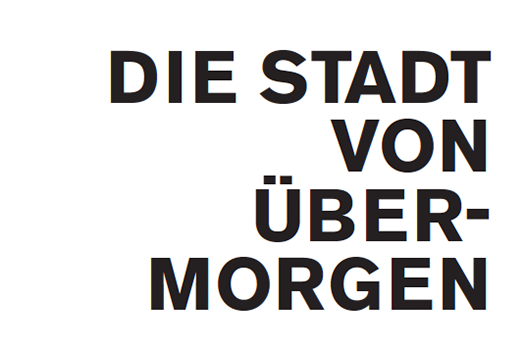

Documentation of an expert meeting of the Federal Ministry for the Environment, Nature Conservation, Building and Nuclear Safety (BMUB) and the Federal Institute for Research on Building, Urban Affairs and Spatial Development (BBSR)
Thoughts on the city of tomorrow
Trends and possible futures of urban development in Germany
Documentation Expert Meeting
11-12.12.2013, Bonn
Prof. Dr. Stefan Carsten, Ludwig Engel
The long-time existence of the Leipzig-Charter and the establishment of the National Urban Development Policy prompted to draw a first conclusion and to draw closer attention to the future of cities and towns. In the spring and summer of 2012, as a result of a comprehensive and multi-level cooperation and participation process, international and national experts developed a memorandum entitled "Urban energy - future tasks of the cities". It identifies the current key tasks of sustainable urban development:
- The careful ecological reconstruction of buildings and neighborhoods,
- The technological renovation of city technical infrastructure,
- The development of new forms of mobility and mobility organization,
- Social integration.
These four major tasks have already been discussed extensively and are the subject of numerous expert panels – usually, however, separated from each other and also still locked in various closed professional and political circles. The energy revolution and the fight against climate change, the modernization of technical infrastructure, new forms of mobility and social integration are not separated issues and policy fields, but work together in an urban context, conflict or promote themselves. Technical, economic, ecological and social processes are not separated here, but stand for transformation- and innovation potential in the context of cultural identity of urban societies. The reconstruction and adaptation of cities and regions to these challenges therefore presupposes linking these various fields of action and their actors beyond the respective path dependencies. This doesn't require a holistic approach as a theory, but an understanding of interfaces, influences of various development fields and, based on that, a combination of thinking and linking possible solutions with the goal of designing potential developments.
The political demands for sustainable urban development are formulated from very different areas and fields of expertise. The question is whether the solutions offered from both, different interests as well as thematic approaches are truly fit for the future - and that from the perspective of the future itself! What trends in the area are considered to be robust in future, where, as a result of immense uncertainties or discontinuously extending future prospects, are we driving by sight, which guidelines for future development are we able to identify and where are we able to create orientation – at least through plausible conclusions? Questions to which urban development policy must provide answers. In order to reach this end, policy makers must reach out to other disciplines and areas, to integrate existing knowledge and potential in developing efficient and employable strategies. Especially in times of tight financial budgets at all federal levels and a dynamic simultaneously potentiating international integration of key development parameters, this is an enormous challenge and necessity at the same time.
The aim of the experts call "The City of the Day After Tomorrow" was to identify the key drivers and risks of urban development, to present current considerations in this field, to extract resultant consequences for the urban development policy of tomorrow and the day after tomorrow and to shed light onto the instruments: What has proven to be of value in the past, where do proven and established approaches have to be adapted and where do new instruments have to be developed?